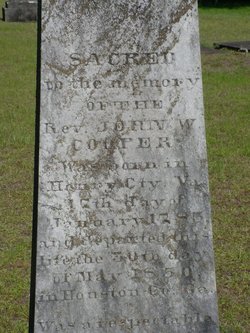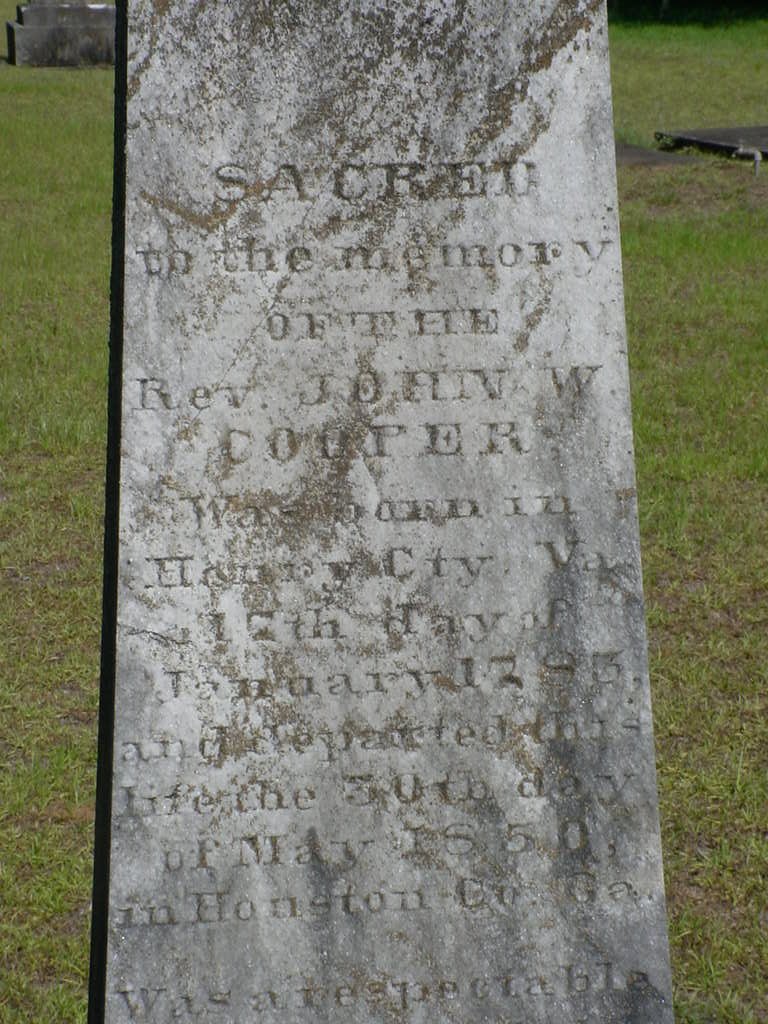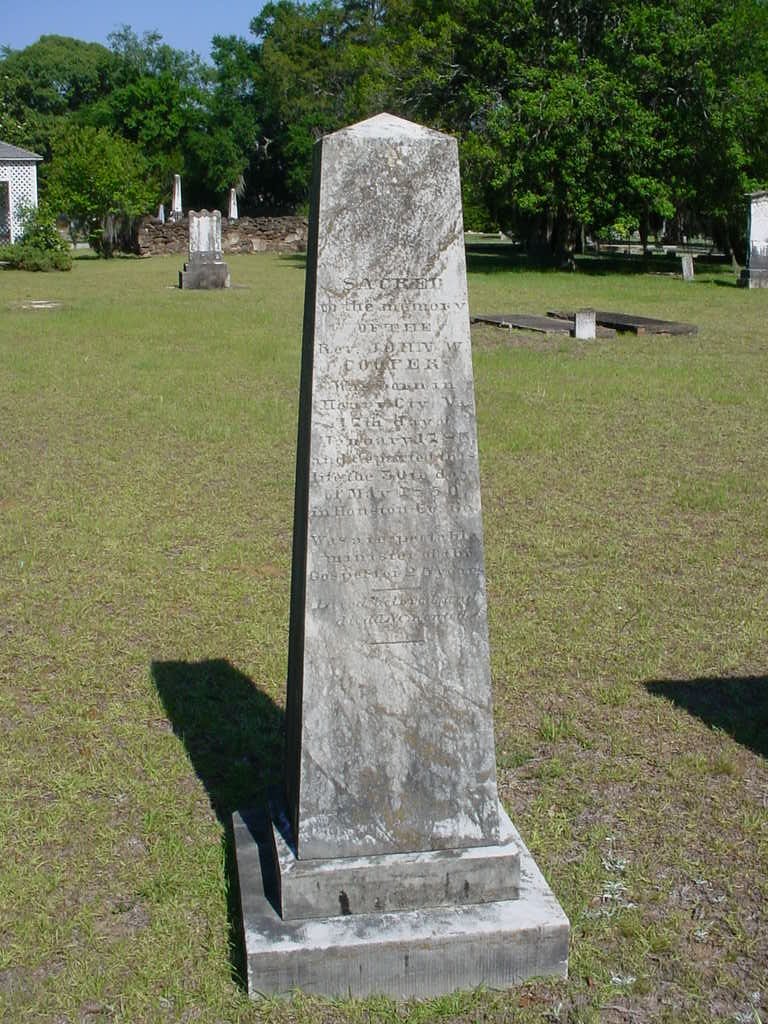Elder John W. Cooper was born in Henry county, Virginia, January 17th, 1783, and, with the family, removed to Wilkes county, Georgia, in 1786. He united with the old Ebenezer church, and was baptized by elder Jesse Mercer in 1805; some time afterwards, his membership was removed to Rehoboth church. In the winter of 1825 he removed to Monroe county, Georgia; was a member of the Mount Pleasant church, where he was ordained as a minister of the gospel in 1826, Elder Davis Smith being one of the Presbytery. In the winter of 1828 he removed to Harris county, Georgia, being one of the earliest settlers, which was soon after the purchase of the territory from the Indians, lying between the Flint and Chattahoochee rivers. In a few months after this, he aided in the constitution of Sardis church, in the western part of the county, which was one of the first churches organized west of the Flint river. He aided in the constitution of most of the churches in that immediate section of the State, as also in that which lay opposite in Alabama. He was a prime and active mover in the organization of the Western Association, of which he was elected moderator in 1841, the introductory sermon of which session was preached by Elder Jesse Moon, the father Miss Lottie Moon, now a missionary to China. He was re-elected annually, until his removal to Houston county, in the winter of 1848, and if my information be correct, was elected that year by acclamation, being the last session of that body he ever attended. He was present at the Georgia Baptist Convention in Marietta, in 1850, at which the illness that ended his life began. Returning home quite indisposed, he went to the monthly meeting of what was then Sandridge, now Factory church, Houston county, the first Sabbath in May, 1850, where he preached his last sermon. He died May 30th, 1850, with an abiding faith in the Saviour, whose glorious gospel he had preached more than forty years, his last words being, "O, that I could live to warn sinners!"
The education of the subject of this sketch was very limited. In his early life, neither means nor facilities were at his command. As a minister, the Bible was almost his only book of study, and with it, as was common with Baptist preachers in his day, he was very familiar. His views were not warped by the sayinggs of men; while he was solid as a rock in the doctrines of grace and the ordinances of the gospel, and never compromised with error, he was never rash. In Western Georgia, where he spent most of his ministerial life, he abounded in labors. So far as remembered, he was never without four churches, and unfrequently, to attend some of them, it required from Friday morning till Monday night. It was rare, indeed, he ever failed to meet his appointments. As was not uncommon in those early times, he frequently made tours of preaching to destitute sections and regions beyond. His preaching was without much method, always abounding in scriptural language, truth and illustration. He was of tender heart, often affected to tears. His labors were greatly blessed, and large churches were built up under his ministry. One of his sons says that a prayer meeting was held in a private house, at which began a work of great power. The meeting was removed to old Mountain Creek church, near which he lived, and continued, without interruption, forty-five days, during which one hundred and sixty-three persons were added to the church, and that, too, when the country was thinly settled.
Though rather emotional, he did not approve of noisy meetings. It is worthy of note, however, that on one occasion he was the subject of what was adjudged an unusual measure of the Holy Spirit's influence. It occurred at Beech Spring church, where he was aiding Elder George Granberry in a meeting of much interest. He had preached at the forenoon service, at the close of which his family physician observed a peculiar appearance of countenance, and insisted that he should go into the open air, which he declined, further than taking a seat upon the door-steps. In a moment, he began clapping his hands gently, and expressing himself as being very happy. He exhorted every unrenewed person whom he saw, and at the house of a precious man, (Deacon Joel Hood,) he had every servant called to the bed upon which he lay, and urged upon them immediate repentance. The clapping of hands, (which seemed involuntary,) and the talking continued, with a moment's interruption, until a late hour of the night, when "tired nature" succumbed to sleep. In the morning he was quite restored, and said the whole affair seemed as a dream. The writer witnessed the entire scene. He received but little for preaching. It is probable he never mentioned money to a church. I have heard him say a church to which he preached many years, and was not less than fifteen miles distant from him, never paid him enough to shoe his horse. At another, an old brother was appraoched by one of the deacons, who replied, "It is as much his business to preach as it is mine to go and hear;" and, doubtless, not a few are possessed with a like sentiment to-day.
His habits of industry are regularity would have secured him an abundance of this world's goods had he given himself to their acquisition. But he "chose rather to suffer affliction with the people of God than enjoy the pleasures of sin for a season, esteeming the reproach of Christ greater riches than the treasures of the world." As a man, he always enjoyed the entire confidence of his acquaintances, which confidence was never abased. He paid his debts, was peaceable in society, never shirked responsibility, lived and died without a stain upon his character. As a christian, he was prayerful -- walked by faith rather than by sight -- without pretension wholly, and with the exception named above, his religious life was even, and his end peace.
Rev. George F. Cooper, of Americus, one of the best and ablest men in the State, is a son of his. [Source -Georgia Baptists: Historical and Biographical. Jesse H. Campbell. 1874]
John W. Cooper
(b 1783, d 30 May 1850). Born in Henry County, VA. Departed this life in Houston County, GA. Reverend. "Sacred to the memory". Was a respectable minister of the gospel for 25 years. Lived beloved, and died lamented.
Elder John W. Cooper was born in Henry county, Virginia, January 17th, 1783, and, with the family, removed to Wilkes county, Georgia, in 1786. He united with the old Ebenezer church, and was baptized by elder Jesse Mercer in 1805; some time afterwards, his membership was removed to Rehoboth church. In the winter of 1825 he removed to Monroe county, Georgia; was a member of the Mount Pleasant church, where he was ordained as a minister of the gospel in 1826, Elder Davis Smith being one of the Presbytery. In the winter of 1828 he removed to Harris county, Georgia, being one of the earliest settlers, which was soon after the purchase of the territory from the Indians, lying between the Flint and Chattahoochee rivers. In a few months after this, he aided in the constitution of Sardis church, in the western part of the county, which was one of the first churches organized west of the Flint river. He aided in the constitution of most of the churches in that immediate section of the State, as also in that which lay opposite in Alabama. He was a prime and active mover in the organization of the Western Association, of which he was elected moderator in 1841, the introductory sermon of which session was preached by Elder Jesse Moon, the father Miss Lottie Moon, now a missionary to China. He was re-elected annually, until his removal to Houston county, in the winter of 1848, and if my information be correct, was elected that year by acclamation, being the last session of that body he ever attended. He was present at the Georgia Baptist Convention in Marietta, in 1850, at which the illness that ended his life began. Returning home quite indisposed, he went to the monthly meeting of what was then Sandridge, now Factory church, Houston county, the first Sabbath in May, 1850, where he preached his last sermon. He died May 30th, 1850, with an abiding faith in the Saviour, whose glorious gospel he had preached more than forty years, his last words being, "O, that I could live to warn sinners!"
The education of the subject of this sketch was very limited. In his early life, neither means nor facilities were at his command. As a minister, the Bible was almost his only book of study, and with it, as was common with Baptist preachers in his day, he was very familiar. His views were not warped by the sayinggs of men; while he was solid as a rock in the doctrines of grace and the ordinances of the gospel, and never compromised with error, he was never rash. In Western Georgia, where he spent most of his ministerial life, he abounded in labors. So far as remembered, he was never without four churches, and unfrequently, to attend some of them, it required from Friday morning till Monday night. It was rare, indeed, he ever failed to meet his appointments. As was not uncommon in those early times, he frequently made tours of preaching to destitute sections and regions beyond. His preaching was without much method, always abounding in scriptural language, truth and illustration. He was of tender heart, often affected to tears. His labors were greatly blessed, and large churches were built up under his ministry. One of his sons says that a prayer meeting was held in a private house, at which began a work of great power. The meeting was removed to old Mountain Creek church, near which he lived, and continued, without interruption, forty-five days, during which one hundred and sixty-three persons were added to the church, and that, too, when the country was thinly settled.
Though rather emotional, he did not approve of noisy meetings. It is worthy of note, however, that on one occasion he was the subject of what was adjudged an unusual measure of the Holy Spirit's influence. It occurred at Beech Spring church, where he was aiding Elder George Granberry in a meeting of much interest. He had preached at the forenoon service, at the close of which his family physician observed a peculiar appearance of countenance, and insisted that he should go into the open air, which he declined, further than taking a seat upon the door-steps. In a moment, he began clapping his hands gently, and expressing himself as being very happy. He exhorted every unrenewed person whom he saw, and at the house of a precious man, (Deacon Joel Hood,) he had every servant called to the bed upon which he lay, and urged upon them immediate repentance. The clapping of hands, (which seemed involuntary,) and the talking continued, with a moment's interruption, until a late hour of the night, when "tired nature" succumbed to sleep. In the morning he was quite restored, and said the whole affair seemed as a dream. The writer witnessed the entire scene. He received but little for preaching. It is probable he never mentioned money to a church. I have heard him say a church to which he preached many years, and was not less than fifteen miles distant from him, never paid him enough to shoe his horse. At another, an old brother was appraoched by one of the deacons, who replied, "It is as much his business to preach as it is mine to go and hear;" and, doubtless, not a few are possessed with a like sentiment to-day.
His habits of industry are regularity would have secured him an abundance of this world's goods had he given himself to their acquisition. But he "chose rather to suffer affliction with the people of God than enjoy the pleasures of sin for a season, esteeming the reproach of Christ greater riches than the treasures of the world." As a man, he always enjoyed the entire confidence of his acquaintances, which confidence was never abased. He paid his debts, was peaceable in society, never shirked responsibility, lived and died without a stain upon his character. As a christian, he was prayerful -- walked by faith rather than by sight -- without pretension wholly, and with the exception named above, his religious life was even, and his end peace.
Rev. George F. Cooper, of Americus, one of the best and ablest men in the State, is a son of his. [Source -Georgia Baptists: Historical and Biographical. Jesse H. Campbell. 1874]
John W. Cooper
(b 1783, d 30 May 1850). Born in Henry County, VA. Departed this life in Houston County, GA. Reverend. "Sacred to the memory". Was a respectable minister of the gospel for 25 years. Lived beloved, and died lamented.
Family Members
Advertisement
Records on Ancestry
Advertisement








